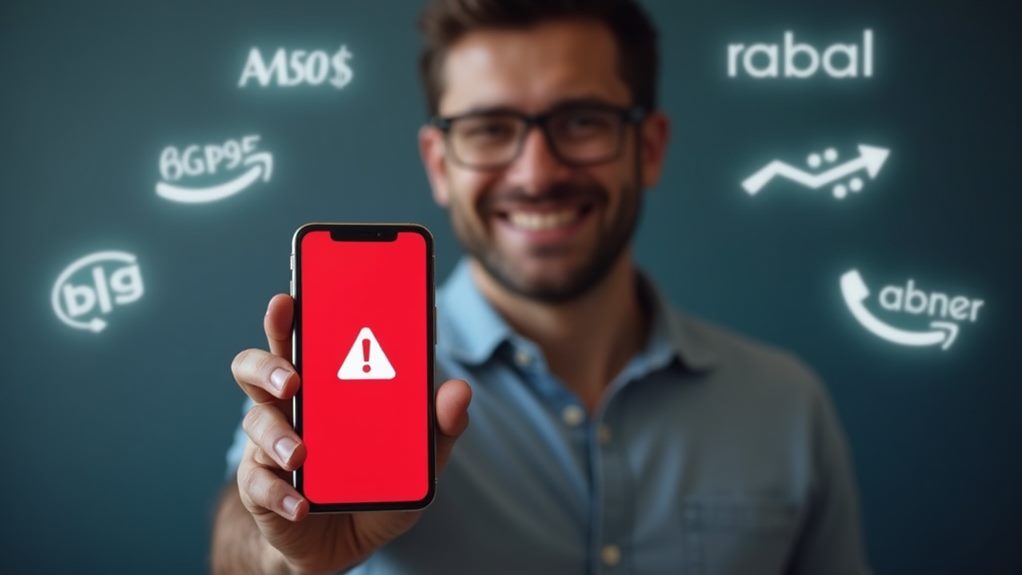VoIP numbers aren't widely accepted due to significant security and verification challenges. You'll find that financial institutions and service providers reject these numbers because they lack physical location ties, making user identity verification and fraud tracking difficult. VoIP's inherent mobility and limited traceability create vulnerabilities that don't align with strict regulatory compliance requirements, especially in banking and government services. Phone carrier authentication systems often can't properly validate VoIP numbers through standard protocols, and their easy acquisition makes them attractive for fraudulent activities. Understanding these technical and regulatory hurdles reveals why organizations prioritize traditional phone numbers for security-critical operations.
Security and Trust Concerns

Establishing trust in VoIP systems remains a significant hurdle for financial institutions and regulatory bodies, primarily due to inherent security vulnerabilities. When you're using VoIP numbers, you'll find that banks and other financial institutions often reject them outright, as these numbers aren't anchored to physical locations, making it harder to verify your identity and track potential fraudulent activities.
The risks associated with VoIP technology underscore the necessity for essential security measures that protect against potential threats.
You'll notice that the challenge extends beyond individual cases, as institutions implement blanket security policies that treat all VoIP services with equal suspicion. If you're sharing a VoIP number or using a temporary one, you're particularly vulnerable to restrictions, as multiple users can trigger security flags that affect everyone using that number range.
The issue becomes more complex when you consider that regulatory requirements, especially for organizations like the IRS, explicitly prohibit VoIP numbers for identity verification purposes.
You're also impacted by decision-makers' limited understanding of VoIP technology, which creates a barrier to establishing trust. This knowledge gap leads to overly cautious security measures that don't differentiate between legitimate VoIP users and potential security threats, affecting your ability to conduct financial transactions seamlessly.
Limited Traceability of Users
VoIP numbers present significant identity verification challenges as you can't reliably link them to specific individuals or physical locations, making it difficult for institutions to validate user authenticity.
Many scammers exploit these limitations, employing techniques like caller ID spoofing to deceive victims, further complicating the traceability issue.
When you're using VoIP services, your geographical location becomes virtually untraceable since these numbers aren't bound to fixed addresses like traditional phone lines, creating a critical limitation for services requiring precise user location data.
These inherent traceability limitations create substantial security risks, as you'll find that fraudsters often exploit the anonymity of VoIP numbers to conduct unauthorized activities while evading detection.
Identity Verification Challenges
In today's digital landscape, the limited traceability of VoIP numbers presents significant challenges for identity verification processes. When you attempt to use a VoIP number for important services, you'll often face rejection due to inherent security concerns that institutions have about their authenticity.
These challenges stem from the difficulty in linking VoIP numbers to physical locations or real identities, which leaves them vulnerable to potential interception and unauthorized access vulnerabilities and risks.
Financial institutions and online services have implemented strict regulatory frameworks that make it challenging to accept VoIP numbers for critical security features like two-factor authentication.
You'll encounter several key obstacles when trying to use VoIP numbers:
- Banks and financial services can't effectively verify your identity through VoIP numbers, leading to automatic rejection during account creation.
- Security systems flag VoIP numbers as high-risk due to their potential for fraudulent activities.
- Online platforms like Steam actively block accounts associated with banned VoIP numbers.
- Compliance requirements often prevent institutions from accepting VoIP numbers, even if they wanted to.
The combination of these factors creates a significant barrier for VoIP adoption in identity verification systems, leaving you with limited options for accessing certain online services that require robust authentication methods.
Location Tracking Limitations
Through advanced telecommunications, traditional phone numbers maintain direct links to physical locations and registered users, but VoIP numbers lack this essential geographical tethering. This fundamental limitation creates significant security issues for service providers and institutions that rely on accurate user location data for verification purposes.
When you're using VoIP numbers, you'll find that their limited traceability poses challenges during account registration processes. Unlike cell phones, which are tied to specific carriers and physical locations, VoIP numbers can be accessed from anywhere in the world. This mobility, while convenient, makes it difficult for platforms to verify your true location and identity.
The ease of creating temporary accounts through VoIP services has led many organizations to implement stricter verification protocols. You'll notice that most reputable platforms now require traditional phone numbers for registration, as they provide a more reliable way to track and verify user identity.
This requirement isn't arbitrary – it's a response to the growing need for enhanced security measures. The lack of fixed geographical anchoring in VoIP numbers has made them a common tool for potentially fraudulent activities, prompting widespread rejection by online services.
Security Risk Factors
Alongside basic location tracking issues, limited user traceability represents one of the most significant security vulnerabilities in VoIP systems.
When you're using VoIP numbers, you'll find that many services reject them during account registration due to their inherent security risks and lack of reliable identity verification methods.
Financial institutions and online platforms have established strict security standards that often exclude VoIP numbers because they're associated with a higher risk of fraud.
Here's what makes VoIP numbers particularly concerning from a security perspective:
- They lack the physical infrastructure ties that traditional phone numbers maintain, making user verification more challenging.
- Multiple accounts can share the same VoIP number pool, increasing the risk of fraudulent activities.
- Banks can't effectively trace VoIP numbers back to specific individuals or locations.
- The temporary nature of many VoIP numbers conflicts with long-term account security requirements.
You'll notice that cell phone numbers are preferred for verification purposes because they provide a stronger link between the service and your identity.
This preference stems from the telecommunications industry's established protocols, which have historically provided more reliable user authentication methods.
Phone Carrier Authentication Issues

Traditional phone carriers can't reliably authenticate VoIP numbers through standard verification protocols, creating significant obstacles for institutions that depend on carrier-level verification systems.
You'll find that financial organizations and service providers face substantial challenges in validating the legitimacy of VoIP numbers, as these digital identifiers lack the established trust frameworks associated with traditional mobile carriers.
Your VoIP number may be flagged or rejected during authentication processes because carrier databases often can't properly categorize or verify these numbers against their existing fraud prevention mechanisms.
Carrier Verification Challenges
Authentication presents a significant barrier for VoIP adoption as financial institutions and online services frequently reject VoIP numbers during carrier verification processes. The challenges stem from regulatory frameworks and security measures that prioritize traditional phone carriers over VoIP services.
You'll find that financial institutions often implement strict identity verification protocols that automatically flag VoIP numbers as high-risk options.
Key verification challenges you'll encounter with VoIP numbers include:
- Limited traceability compared to traditional phone numbers, making it difficult for services to verify user identity and location
- Increased risk of fraud due to the ease of obtaining and discarding VoIP numbers, leading to blanket rejections by security systems
- Multiple-user implications where a single banned VoIP number can affect numerous legitimate accounts sharing the same number
- Compliance issues with regulatory requirements, particularly in jurisdictions that mandate specific carrier verification standards
These challenges create a complex ecosystem where you're likely to face rejection during authentication processes, regardless of your VoIP provider's legitimacy.
The situation is further complicated by organizations' tendency to implement universal VoIP restrictions rather than evaluating individual providers' security features.
Fraud Prevention Roadblocks
Security systems deployed by financial institutions create substantial roadblocks for VoIP users during phone carrier authentication processes. When you attempt to use VoIP numbers for account verification, you'll often encounter rejection due to heightened fraud risk assessments. This occurs because your VoIP number isn't tied to a physical address, making it harder for institutions to establish accountability.
You'll find that banks and financial providers don't typically differentiate between various VoIP services. Instead, they're implementing blanket security standards that treat all VoIP numbers as high-risk channels for identity verification. These institutions allocate minimal resources to evaluate individual VoIP numbers, meaning you're likely to face automatic rejection regardless of your provider's legitimacy.
If you're using prepaid mobile numbers, you'll encounter similar restrictions, as they're often grouped with VoIP numbers in risk assessments. The regulatory frameworks guiding these institutions prioritize traditional phone numbers for two-factor authentication, creating a significant barrier for VoIP users.
When you're trying to authenticate your identity, these fraud prevention measures can effectively block your access, even if you're a legitimate user with valid credentials.
Digital Identity Trust Issues
Stemming from deep-rooted institutional distrust, digital identity verification systems consistently flag VoIP numbers as potential security risks, creating significant barriers for users seeking to authenticate their accounts.
Financial institutions enforce strict compliance requirements that often result in the wholesale rejection of VoIP services for two-factor authentication processes.
You'll encounter several key challenges when attempting to use VoIP numbers for identity verification:
- Banks and financial institutions can't reliably trace VoIP numbers to physical addresses, making it difficult to establish user accountability.
- The IRS and other regulatory bodies maintain specific restrictions against VoIP numbers, complicating your ability to meet compliance requirements.
- Decision-makers' limited understanding of VoIP technology leads to overly cautious policies that restrict your authentication options.
- Traditional carrier verification systems aren't designed to properly validate VoIP numbers, resulting in automatic rejections.
These trust issues persist largely due to regulatory frameworks that haven't kept pace with advancing technology.
While VoIP offers numerous benefits, its current limitations in meeting standard digital identity verification protocols continue to impact your ability to use these numbers for critical authentication processes.
Verification System Incompatibilities
Digital identity checks have become a major stumbling block for VoIP adoption, as verification systems frequently reject these numbers due to their inherent characteristics. When you attempt to use VoIP numbers for identity verification, you'll often encounter automated systems that immediately flag them as high-risk, resulting in automatic rejection without any individual assessment of your specific case.
You'll find that verification processes typically require phone numbers that correspond to your credit report information, which VoIP numbers don't provide. This incompatibility stems from the fact that VoIP numbers aren't anchored to fixed physical addresses or traceable to specific individuals.
Additionally, you're likely to experience inconsistent acceptance across different platforms and services, as there's no standardized approach to handling VoIP numbers in verification systems. The technical limitations become particularly evident when you're dealing with financial institutions or government services.
These organizations operate under strict regulatory frameworks that specifically address security vulnerabilities associated with VoIP numbers. As a result, their verification systems are deliberately designed to reject VoIP numbers to maintain compliance and reduce potential fraud risks.
Digital Identity Management Challenges

Throughout identity management systems, VoIP numbers create persistent verification hurdles that you'll encounter when attempting to establish your digital presence. Financial institutions and regulatory bodies have implemented strict security standards that often exclude VoIP numbers from their accepted identity verification methods, primarily due to traceability concerns.
When managing your digital identity across various platforms, you'll find these critical challenges:
- Financial institutions routinely reject VoIP numbers for two-factor authentication, requiring you to maintain a traditional mobile number.
- Identity verification systems typically can't validate VoIP numbers against physical addresses, limiting your access to essential services.
- Security standards and compliance requirements often force organizations to exclude VoIP numbers from their accepted verification methods.
- Digital identity management systems struggle to establish user accountability with VoIP numbers due to their virtual nature.
These limitations stem from both technological constraints and regulatory frameworks designed to prevent fraud. As a result, you'll need to carefully consider how VoIP numbers fit into your broader digital identity strategy, particularly when interacting with institutions that prioritize traditional verification methods for security and compliance purposes.
Corporate Risk Assessment Policies
Three key factors drive corporate risk assessment policies regarding VoIP numbers: fraud prevention, regulatory compliance, and security management. When you attempt to use VoIP numbers for verification processes, you'll find that many organizations automatically reject them due to their inherent risk profile.
You're experiencing these restrictions because corporate risk assessment frameworks have identified VoIP numbers as potential vectors for fraudulent activity. Unlike traditional phone numbers, VoIP numbers don't tie to physical locations, making it difficult for companies to establish accountability or trace suspicious activities.
You'll notice that financial institutions, in particular, implement strict security policies that exclude VoIP numbers from their verification systems.
When you're trying to understand why organizations won't accept your VoIP number, consider that their risk assessment protocols are often driven by regulatory requirements and industry-wide security standards. Your VoIP number, despite being legitimate, gets caught in broad security measures designed to protect against fraud.
These corporate policies typically prioritize risk mitigation over individual convenience, reflecting the financial sector's need to maintain robust security frameworks and comply with regulatory obligations.
Technical Infrastructure Limitations

Technical infrastructure limitations create considerable barriers when you're trying to use VoIP services for institutional verification. The fundamental challenges stem from both technological constraints and protocol incompatibilities that affect your ability to implement secure, reliable communications.
Key technical limitations you'll encounter include:
- Internet dependency that can compromise call quality and reliability, particularly in areas with unstable connectivity
- Incompatibility with established telecommunication protocols, affecting SMS/MMS functionality
- Type-of-number lookup issues that prevent accurate VoIP number identification
- System misclassification of VoIP numbers as landlines, causing verification errors
These technical constraints considerably impact authentication processes and security implementations. When you're dealing with VoIP numbers, you'll find that traditional verification methods often fail due to the underlying architecture differences between VoIP and conventional phone systems.
The absence of robust security features in VoIP implementations compounds these challenges, especially when you're working with legacy SMS protocols that weren't designed with modern security considerations in mind. This combination of technical limitations and security concerns creates substantial obstacles for institutions that require reliable, secure communication channels for their operations.
Regulatory Compliance Requirements
In accordance with stringent regulatory frameworks, financial institutions and service providers face significant constraints when accepting VoIP numbers for identity verification. You'll find that these restrictions stem from compliance requirements that prioritize security and fraud prevention in user authentication processes.
When you're using VoIP services, you should understand that most institutions can't accept these numbers due to specific security standards that traditional telecommunication services must meet. VoIP providers often don't align with these mandatory verification protocols, leading to widespread rejection of their numbers.
You're likely to encounter this limitation across various organizations, especially when dealing with sensitive transactions or government services.
The regulatory landscape you'll navigate varies by region, creating inconsistent acceptance patterns for VoIP numbers. You'll notice that organizations like the IRS have implemented strict policies against VoIP and prepaid numbers for two-factor authentication.
This standardized approach means your VoIP number may be rejected regardless of your specific provider's security measures, as institutions typically enforce blanket policies rather than evaluating individual VoIP services.
These compliance requirements continue to shape how you can use VoIP numbers for verification purposes.
Final Thoughts
You're facing a multifaceted challenge with VoIP acceptance, where security vulnerabilities interweave like threads in a complex tapestry. Your organization's hesitation stems from the razor-thin line between digital innovation and risk management. While VoIP's infrastructure limitations and compliance hurdles create roadblocks, it's the authentication architecture that proves to be the Achilles' heel, requiring precise technical solutions to bridge the digital identity verification gap.

